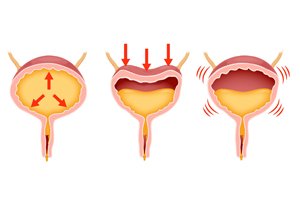

Post Menopause - GSM
Post-menopause is when a woman has gone through menopause, defined as the absence of a menstrual period for 12 consecutive months. During post-menopause, the levels of estrogen and progesterone continue to decline, which can lead to various physical and emotional changes in women.
Post-menopausal women may experience hot flashes, mood swings, vaginal dryness, and an increased risk of certain health conditions such as osteoporosis and heart disease.
What is Genito-Urinary Syndrome of Menopause (GSM)?
GSM is a medical condition that affects women during and after menopause. It is also known as vulvovaginal atrophy or vaginal atrophy. It is a result of the reduced levels of estrogen in the body. Estrogen helps keep the vaginal tissues healthy and well-lubricated.
When estrogen levels drop, the vaginal tissues become thinner, drier, and less elastic. This can cause discomfort, itching, burning, and pain during sexual intercourse.

How Does GSM Affect Post-Menopausal Women?
Post-menopausal women are particularly vulnerable to the effects of GSM because of the natural decline in estrogen levels during menopause. GSM can cause several symptoms that can impact women’s quality of life, including:

Vaginal dryness and irritation

Pain during intercourse

Itching, burning, and discomfort in the vulva area

Urinary incontinence or frequent UTIs

Vaginal dryness and
irritation

Pain during intercourse

Itching, burning, and
discomfort in the vulva
area

Urinary incontinence or
frequent UTIs

Vaginal dryness and irritation

Pain during sexual intercourse

Itching, burning, and discomfort in the vulva area

Urinary incontinence or frequent urinary tract infections (UTIs)
These symptoms can have a significant impact on a woman’s emotional and physical well-being, and they can also affect her intimate relationships. Many women are hesitant to talk about GSM with their doctors can prolong the condition and cause further discomfort.
How Do We Treat GSM?
At BLISSed , we understand that post-menopause can be challenging for women. That’s why we offer a range of treatment options to alleviate menopausal symptoms, including GSM. One of the treatments we offer is Diode Laser.
Diode Laser technology is a non-surgical, minimally invasive treatment option that uses laser energy to stimulate collagen production in the vaginal tissues. Collagen is a protein that gives the skin its strength and elasticity. When collagen production in the vaginal tissues increase, it can help improve the symptoms of GSM.
Here’s how the treatment works:
- A thin, sterile laser probe is inserted into the vagina.
- The laser energy is then directed at the vaginal tissues, creating tiny, controlled injuries.
- These injuries stimulate the body's natural healing response, causing an increase in collagen production.
- This process can help restore vaginal moisture, elasticity, and blood flow, alleviating the symptoms of GSM.
The Diode Laser treatment is safe, painless, and does not require anesthesia. The treatment takes 15 to 20 minutes, and no downtime exists. Women can resume their normal activities immediately after the treatment.
Benefits of Diode Laser for GSM Treatment
Diode Laser technology has been proven to be an effective treatment option for GSM. It offers several benefits that make it an attractive option for women experiencing symptoms of GSM. Here are some of the benefits of Diode Laser technology for GSM treatment:
Non-Surgical and Minimally Invasive
Unlike traditional surgical treatments for GSM, such as vaginoplasty, Diode Laser technology is non-surgical and minimally invasive. It does not require incisions or anesthesia, reducing the risk of complications and minimizing downtime.
Improved Vaginal Health
The Diode Laser treatment stimulates collagen production in the vaginal tissues, which helps to restore the natural elasticity and moisture in the vagina. This can help alleviate symptoms of GSM, such as vaginal dryness, itching, and discomfort. The treatment can also improve sexual function and overall vaginal health.
Painless
Diode Laser technology is painless and does not cause discomfort during the treatment. The laser energy is delivered controlled and precisely, so women can relax during the treatment and experience minimal discomfort.
Quick And Convenient
The Diode Laser treatment takes 15 to 20 minutes, with no downtime. Women can resume their normal activities immediately after the treatment, which makes it a convenient option for busy women.
Long-Lasting Results
The results of Diode Laser treatment for GSM can last up to 12 months. Women who undergo the treatment can expect to experience improved vaginal health and symptom relief for an extended period.

Using non-invasive techniques like laser and pain-free procedures like PRP (platelet-rich plasma) shots, we provide you with a safe and effective way of treating them.
Contact us
Gala no 2, PTC Building Orchid Suburbia, Near Dhanukarwadi, Metro Station Link Road, Kandivali West, Mumbai, India - 400067

Using non-invasive techniques like laser and pain-free procedures like PRP (platelet-rich plasma) shots, we provide you with a safe and effective way of treating them.
Contact us
Gala no 2, PTC Building Orchid Suburbia, Near Dhanukarwadi, Metro Station Link Road, Kandivali West, Mumbai, India - 400067
© 2024 Blissed Intimate Health Clinic – All Right Reserved.
